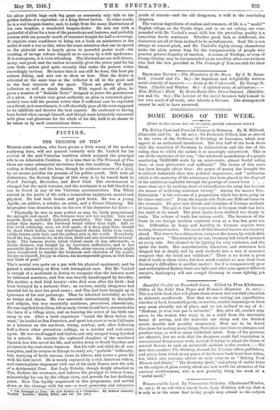FICTION.
THE TRIUMPH OF TIM.•
MIDDLE-AGED readers, who have grown a little weary of the modern scallywag hero, will not quarrel violently with Mr. Vachell for his revival of the mid-Victorian tradition which assigned the principal rale to an Admirable Crichton. It is true that in The Triumph of Tim there are some substantial deviations from this tradition. The happy ending is denied, and the hero, though ho achieves success of a kind, by no means justifies the promise of his golden youth. Still, with all deductions, tho literary lineage of this story is to be traced back to Frank Fairlegh, Rarenshoe, and Hard Cash. The environment is changed but the spirit remains, and the sentiment is as full-blooded as can be found in any of the Victorian sentimentalists. Tim White started in the battle of life with a tremendous equipment, mental and physical. Ile had both brains and good looks. He was a young Apollo, an athlete, a scholar, an artist, and a Prince Charming. His biographer thus describes him on the eve of his departure for Eton :-
" Physically he was as near perfect as may be, finely proportioned for strength and speed. His features were not too regular. Lips and nostrils finely modelled indicated sensibility. Tho chin was round rather than square ; the forehead broad rather than high. Add to this vivid colouring, eyes, set well apart, of a deep grey-blue, shaded by short black lashes, sun and wind-tanned cheeks, white even teeth, ruddy-brown curly hair, and the jolliest grin in the world. Everybody liked the boy, because he, in his turn, liked and was interested in every- body. The famous statue which Cabral made of him afterwards, a discus thrower, was bought by an American millionaire, and is less accessible than it deserves to be. Rodin, alone among sculptors, might have transferred to marble the freshness and alertness of the youth, his joy in himself, his joy in others, his incomparable grace, so free from any taint of pose."
Tim's mental was quite on a par with his physical equipment, and he gained a scholarship at Eton with triumphant ease. But Mr. Vachell is enough of a modernist in fiction to recognize that the balance must be redressed somehow, and Tim was heavily handicapped by heredity. His mother, a frail Irish beauty—who died soon after his birth—had been betrayed by a meteoric Peer ; an austere, saintly clergyman had married her to save her good name ; and Tim had been brought up in ignorance of his real parentage. Thus he inherited instability as well as brains and charm. He was amenable intermittently to discipline and religion, but was essentially mutinous, precocious, chameleonie. He was expelled from Eton, fell an early victim to calf-love, succumbed to the lures of a village siren, and on learning the secret of his birth ran away to sea. After a lurid experience " round the Horn before the mast," he landed at San Francisco, and spent ten years or so in California as a labourer on the sea-front, tramp, cowboy, and, after following half-a-dozen other precarious callings, as a rancher and real-estate agent. He was sandbagged and knifed, and only escaped being lynched by a miracle. .He marries the orphaned daughter of the murdered Spanish don who saved his life, and settles down in South Carolina and prospers in the real-estate business. But his wife and child die of con- sumption, and he returns to Europe to study art, "potboils " brilliantly, but, wearying of facile success, turns to letters, and scores a great hit with his first novel. He is nearly captured by a rich American widow, and contemplates elopement with one of his early flames, now the wife of a detrimental Peer. But Lady Rokeby, though deeply attached to Tim, declines his overtures, and induces the prodigal to return home, acknowledge his son by the village siren, and provide for her declining years. How Tim loyally acquiesced in this programme, and settled down at the vicarage with his son—a most promising and attractive * The TriumpA of Tins: the ,Life History of a Chameleon. By Horace Annesley "Cached. London: Smith, Elder, and Co. [tie. net.]
youth of sixteen—and the old clergyman, is told in the concluding chapters.
Tho various ingredients of realism and romance, of life in a " model " English village, on the Pacific slope, and in an art colony, are com- pounded with Mr. Vachell's usual skill, but the prevailing quality is a somewhat hectic sentiment Whether good, bad, or indifferent, the characters are all of them inclined to be melodramatic. Real life is not always at concert-pitch, and Mr. Vachell's highly-strung chameleons make the plain person long for the companionship of people who practise greater frugality of emotion. A course of Trollopo, or even of George Gissing, may be recommended as an excellent after-cure to those who find the diet provided in The Triumph of Tim too rich for their blood.






























 Previous page
Previous page